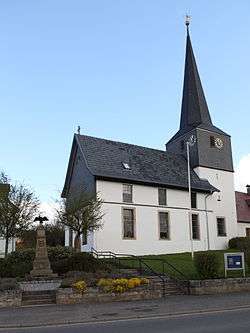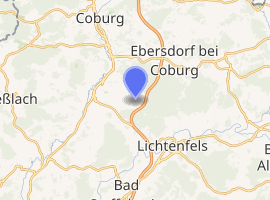Buch am Forst
Buch am Forst is a village of 534 inhabitants (1 January 2019) in the city-district (Kreisstadt) of Lichtenfels in the state of Bavaria in Germany. It is 6 kilometers (3.7 miles) northwest of Lichtenfels and at the western edge of the Lichtenfels Forest (Lichtenfelser Forst). Bundesautobahn 73 [Federal Highway] runs approximately a half-mile (1 km) to the east, while Kreisstraße [District Road] LIF27 goes through the village itself.
Buch am Forst | |
|---|---|
Ortsteil of Lichtenfels, Bavaria | |
 St. Maria Magdalena Evangelical Lutheran Church | |
Location of Buch am Forst 
| |
 Buch am Forst  Buch am Forst | |
| Coordinates: 50°09′N 11°44′E | |
| Country | Germany |
| State | Bavaria |
| Admin. region | Oberfranken |
| District | Lichtenfels (district) |
| Town | Lichtenfels, Bavaria |
| Elevation | 334 m (1,096 ft) |
| Population (2019-01-01) | |
| • Total | 534[1] |
| Time zone | CET/CEST (UTC+1/+2) |
| Postal codes | 96215 |
| Dialling codes | 09571 |
| Vehicle registration | LIF |
History
The first recorded mention of Buch am Forst was in 1215, when its name was spelled as Buoch. At that time, it was a part of the joint inheritance (Ganerbschaft) of the Banz Abbey, the district of Lichtenfels of the Bishopric of Bamberg and the senior line of the von Redwitz family. In 1225 Hermann von Arnstein donated to the Banz Abbey a property in Buch, previously owned by Hugo von Merzebach, and a place, where the Gutenfels Castle was built. But the village still belonged partly to the Prince-Bishopric of Bamberg and partly to the Saxon Duchies until the end of the Holy Roman Empire. On 21 August 1811 the Duchy of Saxe-Coburg and Gotha handed Buch am Forst completely over to the Kingdom of Bavaria. The kingdom then assigned Buch am Forst to the Mainkreis [District of the Main River], which later became Obermainkreis [District of the Upper Main River] in 1817 and then Oberfranken (Upper Franconia) in 1838. Until the end of World War I, Buch am Forst sat on the border between Saxe-Coburg and Bavaria and served as the customs office for Bavaria. It also had a Forestry Office for the nearby Forest of Lichtenfels. In 1818, it merged with the hamlets of Hammer, Seehof and Forsthub to form a single municipality. Throughout the 1830s, it had a manor, a brewery and 2 mills as well as the customs and forestry offices. By 1912, it had gained a post office but the nearest train station was 2.5 miles (4 km) away at Scherneck-Siemau at Itz Valley Railway.[2][3][4][5][6]
Buch am Forst had 325 residents in 1818, 290 residents in 1831,[7] 300 residents in 1840,[8] 629 residents in 1898,[9] 608 residents in 1912,[10] 802 residents in 1950, 777 residents in 1961, 702 residents in 1970 and 557 residents in 2009.[6]
On 1 January 1978 Buch am Forst merged with the city of Lichtenfels.[11]
Religion
Buch am Forst became Evangelical Lutheran in 1528 but it did not get its own parish until 1535.[12] The name of its parish church is St. Mary Magdalene (German: Maria Magdalena). Its present building was built in 1680. Its interior is decorated with ornate wooden galleries and a dark brown coffered ceiling. A painting of the Twelve Apostles, with Jesus in the middle, hangs above the altar.[13]
Regular events
- Arbor Festival [Pflanzkirchweih] in the first weekend of July
- Church Fair [Kirchweih] on the third Sunday of July
Economy
Buch am Forst has two restaurants, a hairdresser, a bakery, grocers, two butchers and a nursery.[14]
References
- (de) Aktuelle Einwohnerzahlen der Stadt Lichtenfels. Retrieved 2 February 2019.
- (de) Dr. Karl Friedrich Hohn, Atlas von Bayern: Geographisch-statistisch-historisches Handbuch zur Kenntnis des Zustandes von Bayern in seiner gegenwärtigen Beschaffenheit für alle Stände [Atlas of Bavaria: Geographical, Statistical and Historical Guide to the Knowledge of the State of Bavaria in Its Current Condition for All Classes] (Nürnberg: Verlag von Johann Adam Stein, 1840), p. 104
- (de) Rev. Dr. Joseph Anton Eisenmann and Prof. Dr. Karl Friedrich Hohn, Topo-geographisch-statistisches Lexicon vom Königreiche Bayern, Erster Band, A-E [Topographical-Geographical-Statistical Dictionary of the Kingdom of Bavaria, First Volume, A-E] (Erlangen: Johann Jacob Palm and Ernst Enke, 1831), p. 219
- (de) Prof. Wilhelm Götz, Geographisch-historisches handbuch von Bayern: II Band (Geographical-Historical Handbook of Bavaria: 2nd Volume), Munich, G. Franz'scher Verlag, 1898, page 183
- (de) Dr. E[rich]. Uetrecht (ed.), Meyers Orts– und Verkehrs-Lexikon des Deutschen Reichs, Band 1: A-K [Meyers Commercial Gazetteer of the German Empire, Volume 1: A-K], Leipzig, Biographisches Institut, 1912, pp. 257-258
- (de) Buch am Forst auf der Webseite der Stadt Lichtenfels
- (de) Eisenmann and Hohn, Lexicon vom Königreiche Bayern, Erster Band, A-E, p. 219
- (de) Hohn, Atlas von Bayern, p. 104
- (de) Götz, Geographisch-historisches handbuch von Bayern: II Band page 183
- (de) Meyers Lexikon des Deutschen Reichs, pp. 257-258
- (de) Statistisches Bundesamt (Federal Bureau of Statistics), ed., Historisches Gemeindeverzeichnis für die Bundesrepublik Deutschland. Namens-, Grenz- und Schlüsselnummernänderungen bei Gemeinden, Kreisen und Regierungsbezirken vom 27. 5. 1970 bis 31. 12. 1982 [Historical Directory of the Municipalities of the Federal Republic of Germany. Name, Boundary and Key Number Changes for Communities, Districts and Administrations between 27 May 1970 and 31 December 1982]. Kohlhammer Verlag, Stuttgart and Mainz, 1983. ISBN 3-17-003263-1, p. 695
- (de) Matthias Simon: Historischer Atlas von Bayern, Kirchliche Organization, Erster Teil, Die Evangelische Kirche, Band 1 (Historical Atlas of Bavaria, Eccclesisastical Organization, First Series, The Evangelical Church, Volume 1). Munich, Kommission für bayerische Landesgeschichte (Commission of the Bavarian State History), pp. 226-227
- (de) http://www.dekanat-michelau.de/html/buch_am_forst.html
- (de) http://www.lichtenfels-city.de/index.php?id=495,32